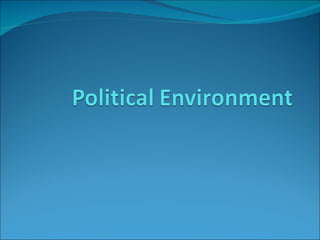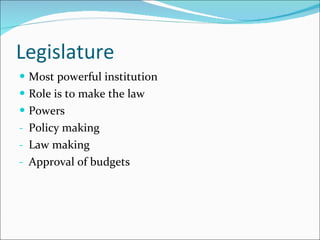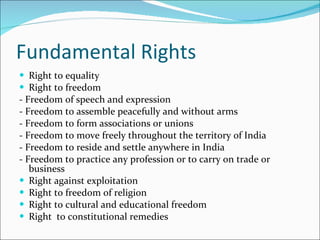Political environment
- 1. Ã˝
- 2. Political system should be Stable Honest Efficient dynamic
- 3. Factors affecting political instability Civil war Declaration of emergency in the country Changes in the form or structure of administration of Govt
- 4. State and Government State, in its wider sense, refers to a set of institutions that possess the means of legitimate coercion, exercised over a defined territory and its population referred to as society. The term government refers to the process of governing, to the exercise of power. It also means the people who fill the positions of authority in a state.
- 5. Political institutions Legislature Executive judiciary
- 6. Legislature Most powerful institution Role is to make the law Powers Policy making Law making Approval of budgets
- 7. Executive Referred to as government Responsible for implementing the law To shape, direct and control the business activities
- 8. Judiciary Responsible for interpreting and applying law It has to look into the exercise of authority by the executives is according to the general rules laid down by the legislature. To settle legal disputes that affects business considerably. Disputes between employers and employees Disputes between two companies Disputes between employees Disputes between employers and the public Disputes between employers and the government
- 9. Relationship between business and government Responsibility Accountability Duty
- 10. Responsibilities of business towards government Regular payment of taxes Voluntary programmes - Sponsoring social welfare programmes - Environmental preservation - Promoting education - Assistance in drought, flood etc. Providing Feed back information Government contracts Providing service to the government through becoming member in advisory boards Corporate contributions to the political activities
- 11. Responsibilities of Government towards business Political institutions Provision of peaceful atmosphere Provision of a system of money and credit Balanced development and growth Provision of basic infrastructure Provision of information To assist small scale industries Transfer of technology Competition with private sector Licensing and inspection Protection from foreign competition
- 12. The Constitution of India Most significant document which is fundamental to the governance of the State. The constitution of Indian Republic is the product of not political revolution, but of the research and deliberations of a body of eminent representatives.
- 13. Three parts of the constitution The Preamble The Fundamental Rights The Directive Principles of State Policy
- 14. The Preamble An introduction to the Constitution and contains its basic philosophy. It states that “ We the people of India having solemnly resolved to constitute ourselves into a Sovereign, Socialist, Secular, Democratic Republic and to secure to all citizens………..adopt, enact and give to ourselves this Constitution.
- 15. Fundamental Rights Right to equality Right to freedom - Freedom of speech and expression - Freedom to assemble peacefully and without arms - Freedom to form associations or unions - Freedom to move freely throughout the territory of India - Freedom to reside and settle anywhere in India - Freedom to practice any profession or to carry on trade or business Right against exploitation Right to freedom of religion Right to cultural and educational freedom Right to constitutional remedies
- 16. Directive principles of state policy A unique feature of our Constitution. Instruments of instructions to the legislature and the executive.















